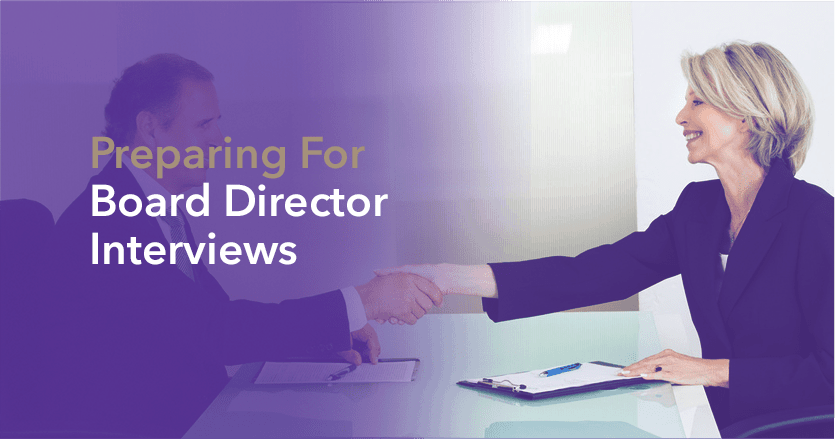Preparing for Board Director Interviews

Similar to all top-level positions, any interview that involves a board director post involves a lot of interviews and a great deal of preparation if you want to be successful. Interviews can be in any form including phone interviews to test your knowledge. The interview can be carried out by the CEO, the Nominating Committee, the entire Board of Directors, the Chairman, or a combination of these formats in no particular order. However, there are similar patterns in the manner the interview is conducted. It is difficult to get an interview these days with competition for board appointments being very high; you should, therefore, try to give your best when presented with an opportunity.
There is various information you need to source prior to interview as an aspiring board director. You should research the company, the board members you will be meeting and you should have sourced information from both publicly available information as well as unofficial sources so that you have a good picture of the organisation and who you will be meeting with. You should also ensure that you get industry data from a wide range of sources in order to get enough information about the industry and company. Your unique skills and experience are the main reason you were invited to a board interview. It doesn’t matter if you undergo one interview or several interviews; you are likely to get the job if you adhere to certain principles.
Keep the interview on the right path
A board interview is conducted to highlight your strengths as a board director and understand in-depth what is your unique value proposition. It is carried out to ensure that you know enough about the company and if appointed, that you are ready to oversee its business activities. The activities can include the chief responsibilities of directors such as reviewing and developing the business strategy, setting compensation for directors, helping out with CEO succession, protecting the value of shareholder, ensuring proper risk management and protecting corporate integrity. These activities are key and you need to be knowledgeable enough to discuss them diplomatically and demonstrate sound decision making capabilities.
Ensure you ask the perfect questions
Before going for a board interview, you should be fully prepared to ask the right questions with respect to the company and display your knowledge of the organisation. It is better to display your knowledge by asking the right questions rather than telling the interviewers about their company. For instance, you can ask what opportunities they foresee in the future and what risks they believe that they may encounter. Ask them how economic conditions affect their business plans and strategic direction. These are very good questions. You can also decide to ask questions about boardroom dynamics and culture; the role management plays at meetings. Strive to also know how the board balances interference and oversight.
Prepare, prepare and prepare
Just like any job interview, you should come fully prepared to the board interview. Ensure that you know all the board members you would be meeting. Try to carry out a research with respect to their experience, skills and background. Try to know the ratio of executive to non-executive board members and try to ascertain before the interview who the independent board members are. You should also know the challenges and opportunities of the company as well as try to gain a strategic understanding of the company. Finally, you should know if the company is undergoing high growth through acquisitions or if the company is undergoing transformational changes.
Ensure you leave a feedback on the company
At the interview, you can be possibly asked for your opinion on the company’s challenges, strategy and risks. Your reply would enable the interviewers to know how well you know the company. If there are any obvious weaknesses, try to explain to them in a tactical manner and balance it with positive ideas. You will also be tested on how well you can give constructive feedback without being harsh. Equally, some interviewees make the common error of being too enthusiastic such that they rush to praise a company by offering only compliments. This isn’t good enough as there is room for improvement in every organisation and potential board members must have the capacity to provide balanced feedback.
Final word
Do not forget that a board interview is a two-way street and you should approach the discussion as you would an important business meeting where there should be an equal exchange of information so that you can assess if the board director appointment is appropriate for both parties. No matter how much you desire a board seat, you must make sure you are making a balanced decision and are not swept up in the excitement of being offered a board directorship.
